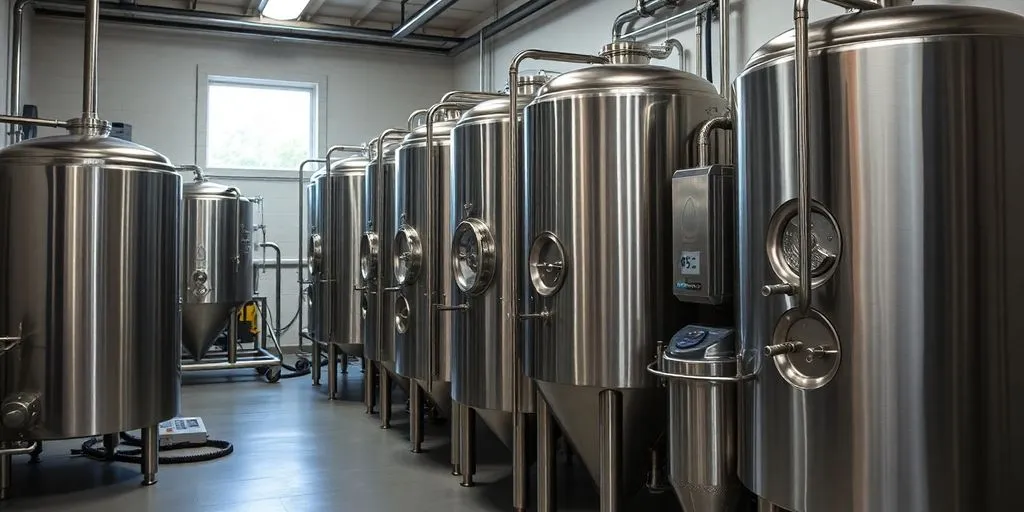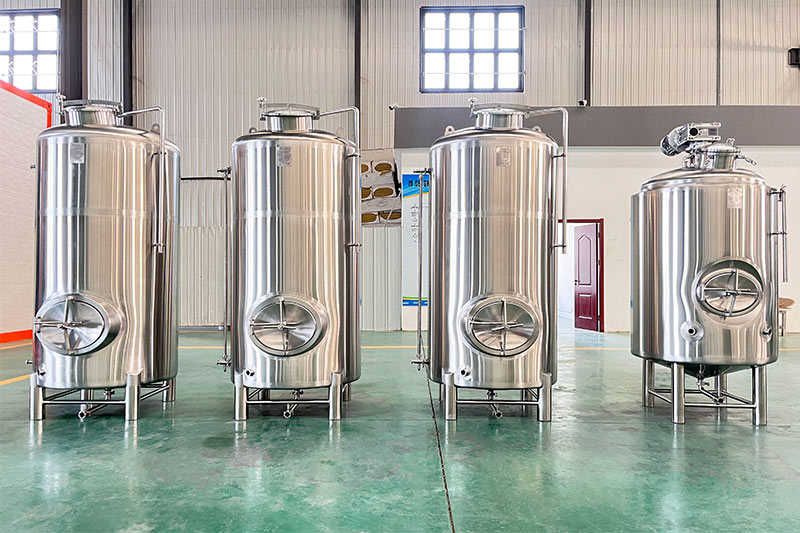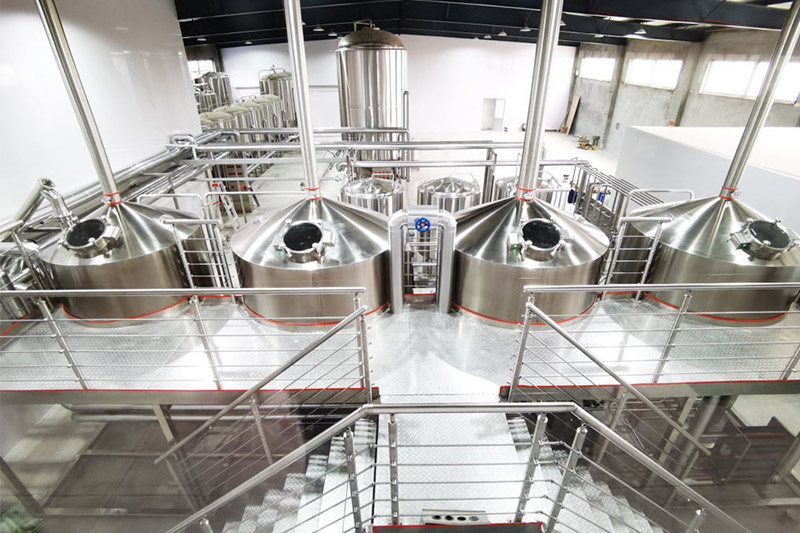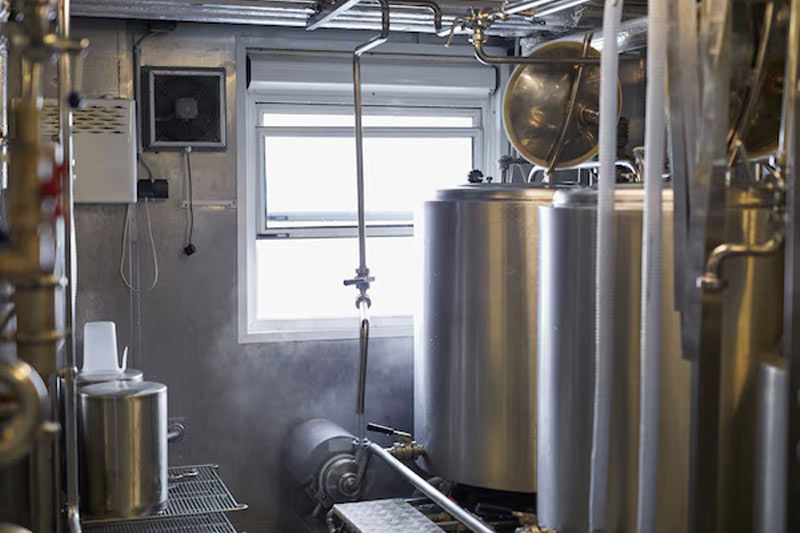In the world of beer brewing, the right equipment can make all the difference between a good beer and a great beer. Whether you’re a commercial brewer or a homebrewer, understanding the nuances of brewing equipment and its applications is essential. This article will serve as your comprehensive guide to commercial brewing equipment, offering insights into the best practices for selecting and utilizing the right tools to elevate your brewing experience.

Why Read This Article?
This guide is packed with valuable information on the different types of brewing equipment available, their functions, and how they contribute to the brewing process. By understanding these elements, you’ll be empowered to make informed decisions, whether you’re setting up a new brewery or upgrading your existing brewing system. If you’re passionate about creating quality beer, read on!
What is Commercial Brewing?
Commercial brewing refers to the process of producing beer on a larger scale for sale and distribution. Unlike home brewing, which is often done for personal consumption, commercial brewing requires a deeper understanding of brewing science, quality control, and equipment specifications.
The Growth of Commercial Breweries
The craft beer movement has spurred a significant increase in the number of commercial breweries. As more people seek unique flavors and high-quality beer, the demand for specialized brewing equipment has skyrocketed. This shift is not just about producing more beer; it’s about creating a consistent product that meets consumer expectations.
Why Invest in Quality Brewing Equipment?
Investing in high-quality commercial brewing equipment is crucial for achieving excellence in beer production. Quality equipment ensures consistency, efficiency, and superior flavor profiles in your brews.
Key Benefits of Quality Equipment
- Durability: Equipment made from 304 stainless steel is resistant to corrosion and wear, ensuring longevity.
- Efficiency: Properly designed brewing systems reduce energy consumption and maximize output, making your brewing process more sustainable.
- Sanitation: Quality brewing equipment is designed with sanitation in mind, minimizing the risk of contamination.
What Types of Brewing Equipment Are Essential?
Here are some fundamental types of brewing equipment every brewery should consider:
1. Mash Tun
The mash tun is where the grains are mixed with hot water to convert starches into sugars. A stainless steel mash tun is often preferred for its durability and easy cleaning.
2. Fermenters
Fermenters are essential for allowing yeast to convert sugars into alcohol. Conical fermenters offer the added benefit of easy yeast removal.
3. Kettles
A brew kettle is where the wort is boiled, and hops are added. Investing in a high-quality kettle can significantly enhance the brewing process.
4. Pumps and Valves
Wort pumps and valves facilitate the movement of liquids throughout the brewing process. Proper fittings and connections are essential for maintaining flow and preventing leaks.
How to Choose the Right Brewing Supplies?
Selecting the right brewing supplies can greatly influence the quality of your beer. Here are some tips to guide your choices:
Research Your Options
Before making a purchase, research various brands and models of brewing equipment. Look for reviews and testimonials from other brewers to understand their experiences.
Consider Your Brewing Scale
Whether you’re setting up a microbrewery or a large-scale commercial brewery, the scale of your operation will dictate the type and size of equipment you need. For instance, a 3.5 bbl system is ideal for small craft breweries, while larger operations may require 15 bbl systems.

What is the Role of a Grain Mill in Brewing?
A grain mill is an essential piece of equipment that grinds grains into a coarse powder, allowing for better extraction of sugars during the mash process.
The Importance of Milling
Correctly milled grains ensure that the mash process is efficient. Overly fine milling can lead to a stuck mash, while coarse milling may result in poor sugar extraction.
Types of Grain Mills
There are various types of grain mills, including:
- Two-roller mills: Best for small to medium brewers.
- Three-roller mills: Offer better efficiency for larger batches.
How Does Fermentation Work in Brewing?
Fermentation is one of the most critical steps in the brewing process. During fermentation, yeast converts the sugars extracted from grains into alcohol and carbon dioxide.
The Fermentation Process
- Primary Fermentation: This initial phase typically lasts one to two weeks and is where most of the alcohol is produced.
- Secondary Fermentation: Some brewers opt for a secondary fermentation to enhance flavor clarity and stability.
Importance of Fermentation Temperature
Maintaining a consistent fermentation temperature is vital for ensuring that yeast performs optimally. Fluctuations can lead to off-flavors in your beer.
What are the Different Types of Brewing Tanks?
Brewing tanks come in various types, each designed for specific stages of the brewing process:
1. Brite Tanks
Brite tanks are used for conditioning beer after fermentation. They allow for carbonation and the addition of any final ingredients.
2. Fermentation Tanks
These tanks are designed specifically for fermentation and come in various sizes, including conical fermenters for efficient yeast management.
3. Storage Tanks
Storage tanks are used to hold finished beer until it’s ready for distribution. Proper insulation is crucial for maintaining temperature.
What is the Importance of Temperature Control in Brewing?
Temperature control is vital in both the mash and fermentation stages of brewing.
Effects of Temperature on Brewing
- Mash Temperature: The temperature at which you mash your grains will affect the enzymes’ activity, influencing sugar extraction.
- Fermentation Temperature: Yeast activity is highly sensitive to temperature. Maintaining the right temperature can prevent the production of unwanted flavors.
Solutions for Temperature Control
Investing in a temperature control system can help maintain optimal brewing conditions. This includes equipment like heat exchangers and fermentation jackets.
How to Maintain Your Brewing Equipment?
Proper maintenance of your brewing equipment is essential for ensuring the longevity and quality of your brews.
Regular Cleaning
Implement a regular cleaning schedule for all equipment to prevent contamination. Use sanitary cleaning solutions to ensure all surfaces are free from residues.
Inspections and Repairs
Regularly inspect all components, including pumps and valves, for wear and tear. Addressing minor issues promptly can prevent costly repairs or downtime.
Where to Buy the Best Brewing Equipment?
Finding the right supplier for your commercial brewing equipment is crucial. Here are some options:
Local Suppliers
Look for local suppliers that specialize in brewing solutions. They often offer personalized service and can provide valuable insights based on your specific needs.
Online Retailers
Many reputable online retailers offer a wide range of brewing equipment, including SS Brewtech products. Ensure they have good customer support and return policies.
FAQs
304 stainless steel is the preferred material due to its durability and resistance to corrosion.
The brewing process can take anywhere from a few weeks to several months, depending on the type of beer and fermentation process.
While some home brewing equipment can be adapted for commercial use, it’s better to invest in specialized commercial brewing equipment for optimal results.
You can use temperature control jackets or fermentation chambers to maintain a consistent temperature during fermentation.
Conical fermenters facilitate easy yeast removal and can help with clarity and flavor stability in the final product.

Key Takeaways
- Investing in quality brewing equipment is essential for producing great beer.
- Understanding the functions of different brewing equipment can enhance your brewing process.
- Regular maintenance and cleaning are vital for the longevity of your equipment.
- Temperature control plays a crucial role in the fermentation process.
- Finding the right supplier can make a significant difference in your brewing success.
Unable to render image
In summary, mastering the art of beer brewing requires not only skill but also the right equipment. By understanding the various types of commercial brewing equipment, their functions, and the importance of maintenance, you can ensure that your brewery produces high-quality beers consistently. Don’t hesitate to reach out for expert advice and quality equipment tailored to your brewing needs!

